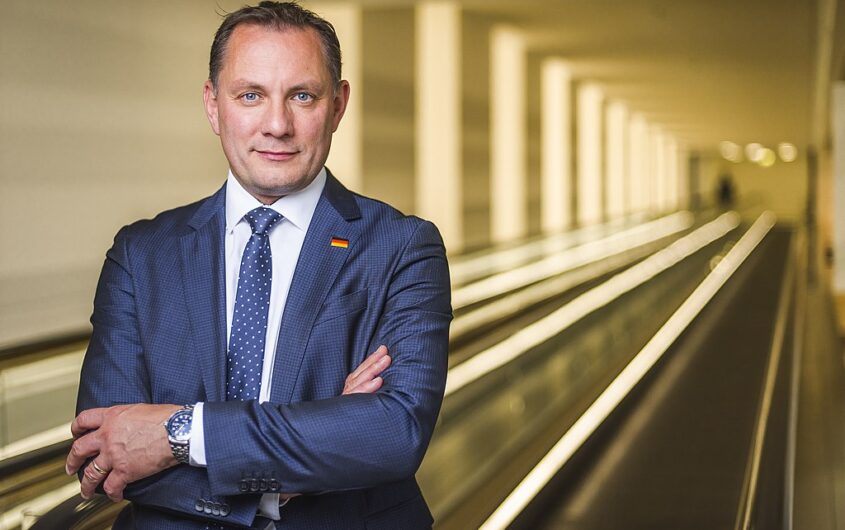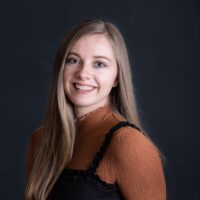
AGI Profiles: Tino Chrupalla

Katie Hausman
Halle Foundation/AGI Intern
Katie Hausman is a Halle Foundation/AGI Intern in summer 2024. She is a recent graduate from American University’ School of International Service where she received a BA in International Studies and minors in Environmental Science and German Language. Having studied European governance and environmental sustainability, she is excited to apply her interests to policy work in the transatlantic relationship between the United States and Germany. After her internship at AGI, Ms. Hausman will be a U.S. Teaching Assistant through Fulbright Austria for the upcoming school year. She is excited to interact with students abroad and practice the German language, even if it may be an Austrian dialect!
Member of the Bundestag and Co-Chair of the Alternative for Germany
Tino Chrupalla is the co-leader of the Alternative for Germany (AfD) with Alice Weidel, elected in 2021. Representing the AfD as the lead spokesman, he is a strong proponent of border security and a return to “traditional Germany.”
Background
Born on April 14, 1975, Tino Chrupalla grew up in the small town of Weißwasser, East Germany, near the Polish border in the state of Saxony. He finished school in 1991 and completed vocational training as a painter and varnisher from 1991-1994. Later, he studied as a master painter and varnisher at the Chamber of Crafts in Dresden from 2000 to 2003 and then started his own construction company.
In an interview with Chrupalla, he fondly remembers his childhood in the GDR (German Democratic Republic), and “die lasse ich mir auch nicht kaputt reden” (I will not let anyone talk me out of it). Remembering the unity of the East Germans with their “love of one’s homeland and singing folk songs,” Chrupalla looks for this solidarity in the whole of Germany now. Although Chrupalla reminisces warmly on his youth in East Germany, he believes reunification was “the best thing that could have happened to the East Germans.”
Before joining the AfD, Chrupalla had joined the Junge Union (Christian Democratic Youth) in the 1990s. He voted for the Christian Democrats (CDU) long before he transitioned to the AfD. Chrupalla found himself dissatisfied with the CDU’s immigration and European policies. As a small business owner, he found the CDU’s growing bureaucracy for self-employed citizens frustrating, hoping to reduce the hurdles for business owners in the AfD instead. He joined the AfD in 2015, and he was elected to the town of Görlitz’s district committee in 2016. In 2017, Chrupalla was elected to the German Bundestag, but he remained district chairman of Görlitz until October 2021. In the Bundestag, he is a member of the Committee on Economic Affairs and Energy where he supports German crafts and small businesses. “Improving Germany’s image” since Angela Merkel’s policies, Chrupalla is a deputy member of the Committee on Foreign Affairs. In 2019, he also became the federal spokesman for the AfD, and in 2021, he became chairman of the AfD parliamentary group, replacing retiring Alexander Gauland in the German Bundestag. Chrupalla became Gauland’s preferred successor after Gauland garnered international attention for downplaying the Nazi era, comparing it to “bird shit” in “more than 1,000 years of successful German history.”
After the 2023 Potsdam far-right meeting in which members of the AfD, CDU, Werteunion, and Identitarian movement discussed the deportation of asylum seekers, German citizens who were “not assimilated,” and foreigners without a residence permit, Chrupalla’s connection to the radical right-wing network was questioned. Although Chrupalla did not attend the 2023 meeting, documents from the meeting detail his participation in a previous far-right meeting, internally called the “fifth Dusseldorf Round” in October 2021. When asked whether he attended the event, he says he “cannot remember anything” and did not deny participation.
Co-Leading the AfD
At the AfD party congress in early July 2024, members worked on modifying the party’s image after recent scandals and re-emphasizing its core issue areas like immigration and reducing aid to Ukraine. Chrupalla emphasized the need for a united party for the September 2024 elections in Saxony, Thuringia, and Brandenburg to “turn this country upside down again.” The effort to unite the party is especially important as other German political parties refuse to join it in a coalition. Signaling increasing unity of the AfD, Chrupalla was confirmed to his position as co-chairman with 82.7 percent of the vote, and Alice Weidel, the other co-chairman, was also overwhelmingly voted in with 79.8 percent “ja.”
In a joint statement from Chrupalla and Weidel on July 16, the co-leaders of the AfD criticized the recent ban of Compact magazine and Conspect Film GmbH. Federal Minister of the Interior Nancy Faeser said that the magazine is “a central mouthpiece of the right-wing extremist scene.” Where Chrupalla and the AfD believe that the ban is a “blow to press freedom,” Faeser has banned it due to its incitement of hatred against Jews, anti-immigrant rhetoric, and threats to parliamentary democracy. The magazine has been characterized as extremist, nationalist, and anti-minority since 2021 by the Federal Office for the Protection of the Constitution. Furthermore, Facebook and Instagram had removed the accounts of the magazine due to the use of hate speech on their platforms. While Germany supports freedom of the press, the government claims that Compact’s businesses “contradict the constitutional order of Germany based on… the principle of non-discrimination.” According to German Basic Law and Act Governing Private Associations, activities can be regulated by banning organizations when they oppose the free democratic order.
Campaign Incidents
At a campaign event in Ingolstadt in October 2023, Chrupalla was allegedly attacked and later taken to the hospital after feeling pain in his upper arm. Chrupalla claimed that he felt a sudden pain in his arm and then felt nauseous and dizzy. The police opened an investigation into the incident, believing it could have been a syringe attack, however they concluded that “there are no indications that Mr. Chrupalla was approached or attacked.” Where the AfD framed the event as an act of political violence, critics believe Chrupalla was inflating the incident to play the victim. As the AfD hosts more campaign rallies and events for the fall 2024 regional elections, it is expected that political violence will increase. Germany has witnessed an overall increase in political violence over the past few years, with 2023 registering 60,028 politically motivated crimes. In May alone, Essen deputy mayor Rolf Fliss (Greens) was hit in the neck and forehead as he left a party meeting, MEP Matthias Ecke (SPD) was attacked in the face after hanging up campaign signs, economics minister of Berlin Franziska Giffey (SPD) was struck on the head, and two regional AfD MPs Miguel Klauss and Hans-Jurgen Gossner were injured by five young people outside of the state Parliament in Stuttgart. Politically motivated attacks have almost doubled in the past five years, signaling a growth in radical politics and increasing safety concerns for every elected and appointed government official.
At an AfD rally in Freiburg in early July 2024, a Nazi slogan was shouted, leading to a police investigation. The slogan “Alles für Deutschland” (Everything for Germany) was chanted, a phrase that had been emblazoned on the service dagger of the SA, the paramilitary organization associated with the Nazi Party. Chrupalla and Alice Weidel were at the 2,000-person event and did not comment on the incident. One can be fined for using the slogan, for which Björn Höcke, the AfD’s Thuringia state leader was previously sentenced.
Relations with Russia
After Alexei Navalny was poisoned in Russia in 2020, the European Union sanctioned thirty-three individuals and two entities tied to the poisoning. Chrupalla was opposed to the sanctions, claiming that the EU was using this case to oppose Nord Stream 2 and become tighter partners with the United States. After the Russian invasion of Ukraine, Chrupalla believed that engaging “in dialogue and cooperation with Russia” would help end the war, whereas the G7 agreed on more sanctions due to Russia’s unprovoked attack.
Recently in the Bundestag, Chrupalla spoke for promoting diplomacy in Ukraine, no arms deliveries to crisis areas, and rejecting military solutions. This stands in contrast to the stance of Scholz’ government, which is providing more military aid to Ukraine and furthering sanctions against Russia. The AfD has a history of close ties with Russia on the basis of “maintaining good relations with all major powers,” even when it threatens the stability of European democracies and the NATO alliance.
Immigration
Chrupalla is strongly against the “indiscriminate mixing of people from different cultures” because he believes it leads to the “dissolution of cultures.” Standing against immigration and globalization, Chrupalla believes that “[cultures of all peoples] are best protected in the place where they are at home.” Not quite against diversity, he applauds Germany’s regional identities such as Saxons, Bavarians, and Swabians; however, he draws the line at immigration from outside German borders. Ironically, Chrupalla is committed to “promoting regional traditions and costumes and making them more visible abroad,” but stands against the “international culture of cosmopolitanism, tolerance, and freedom.” Therefore, it appears as though promoting the German identity and culture should be accepted worldwide, but the visibility of other cultures within Germany is unacceptable.
In an ARD summer interview, Chrupalla focused his discussion on immigration and the need to deport “between 250,000 and 300,000 people living in Germany without the right to remain.” However, at the end of 2023, there were 242,642 people who were required to leave the country. Rejected asylum seekers only represented 60 percent of the total. Even so, many people who are required to leave the country are considered tolerated—they cannot be deported for legal or actual reasons due to the lack of safety in the country of origin, family situation, missing identification documents, etc. Therefore, only 48,700 people are technically deemed required to leave the country immediately. He discussed the need to tighten the German borders; however, due to Germany’s integration in the Schengen Agreement, borders cannot be closed indefinitely, and short-term closures must be approved by the European Commission and extended after every thirty-day period.
Small Businesses and the Trades
As a member of the Committee on Economic Affairs and Energy, Chrupalla campaigns for more support for the trades, as crafts have made “a significant contribution to increasing prosperity in our country in the past.” Villainizing the federal government, Chrupalla discusses on his website how the 2018 annual report failed to mention the word Handwerk (craft) and instead supports the “Hyperakademisierung (hyper-academization) of training.” He also emphasizes the difficulty for small and medium-sized businesses to stay afloat in the face of EU requirements. Rather than investing in its own people, Chrupalla believes that the German federal government has been more eager to help migrants integrate into the trades. His background as a craftsman lends to his strong advocacy for crafts and “middle-class” businesses (as Chrupalla refers to them).
Chrupalla’s website further emphasizes its focus on trade skills, as he writes that “the AfD parliamentary group rejects the exaggerated obsession with academics,” and commits to more appreciation of practical skills. This prioritization is not at odds with technological growth, however, as Chrupalla writes that “we are committed to an innovation-oriented economy.” Chrupalla balances Germany’s need for a technological lead with a return to the trades, appealing to a forgotten middle-class demographic.
Conclusion
From craftsman to spokesperson of the AfD, Chrupalla harps on the return to tradition in Germany. This manifests itself through strict border policies, villainization of academia, prioritization of hard skills, and isolation of allies. However, in an interview with a student in which Chrupalla discussed the importance of teaching classic German folk songs and poems in schools, he could not name a single children’s poem or song, telling the 12-year-old interviewer, “I can’t think of any.” Chrupalla will continue to emphasize the importance of a traditional Germany, even when he cannot back himself up.







